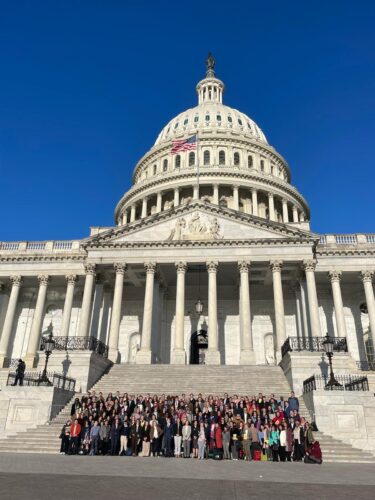Written by Sophia Li, (YC ’24, Harvard Medical School ’28). From Scope, the blog of the Yale Scientific Magazine.
The wind whipped my face as I stood huddled with two hundred people on the Capitol steps. Last month, volunteers and advocates, carrying notepads, pins, and folders, mobilized from forty-seven states and met with two hundred and ten Senate and House offices. We were the Tuberculosis Fighters (TBFighters)—a coalition of survivors, nonprofit organizers, clinical researchers, global health experts, community members, and medical students like me—with a simple ask from Congress: continue funding the fight against tuberculosis.
Tuberculosis is the deadliest killer in the world. Just last year, it claimed more than 1.2 million lives. With the US’s chaotic withdrawal from the WHO and dismantling of the USAID in January, hundreds of thousands of patients have already lost access to proper care.
I want to be clear. Right now, tuberculosis is entirely treatable. And it’s even more ubiquitous than you might think. Around a quarter of all people in the world are infected with tuberculosis. Think about that for a moment: one in four individuals has this disease, and around one in ten will become actively sick.
Having recently graduated from Yale, I’m currently a student at Harvard Medical School, and I study multidrug-resistant tuberculosis—disease that is resistant to first-line medications and is more difficult to treat. In the past few weeks, governmental funding for tuberculosis and global health research has evaporated. It has become apparent that even though research and global health efforts can seem siloed in academic institutions, for progress to continue, we must be active in policy and advocacy.
Organizations like TBAlliance, WeAreTB, Partners in Health, and the Tuberculosis Roundtable have rallied to show that there are ways of making our voices heard and embracing the roles we have as constituents. Like so many TBFighters across the country, I contacted my representative’s congressional office for an in-person meeting. They responded the next day.
The TBFighters represent a unique nexus between the academic, political, and social worlds. The movement is not only advanced by tuberculosis survivors, policymakers, and global health researchers, but also supported by an incredible community of volunteers and passionate fans further inspired by author John Green and his new book, Everything is Tuberculosis.
Our assembly on Capitol Hill represented a powerful moment: the collaboration between scientific expertise and the passion and empathy of community members coming together. Here, I met artists from Minnesota, nonprofit workers from Florida, and anthropology students from North Carolina. Volunteers made bracelets and pins, swapped hats, and passed around copies of John’s work for people to sign like yearbooks.
It can be easy to feel hopeless against the government’s radical dismantling of public health efforts. But it’s important to remember that we’ve never been closer to eradicating tuberculosis than right now. Since 2000, global tuberculosis programs have saved around seventy-nine million lives. In 2023, advocates such as the TBFighters successfully pressured Johnson and Johnson to relinquish their secondary patent on Bedaquiline, a life-saving drug. This allowed for generic drug manufacturing at lower prices, increasing access. More tuberculosis technologies are currently being researched than at any time in history, including multiple Phase III clinical trials for a more effective vaccine.
Now more than ever, funding for tuberculosis is essential. If we relinquish our voices, decades of progress in global health will vanish. Joining advocacy groups like the TBFighters and inspiring collective action are important incremental steps toward progress.
Eradication is possible if we demand congressional funding for the vital work of screening for tuberculosis, researching new drugs, implementing preventative measures, and distributing treatments. If we continue down our current path, USAID estimates that we could see a thirty percent increase in new tuberculosis cases in the next year alone.
Even in the face of sweeping legislative change and extreme setbacks in tuberculosis eradication efforts, we cannot forget that treating tuberculosis is not a medical problem. It’s a financial and attention problem. There is something we can all do about it.
No one should die from this disease. We refuse to accept it any other way.

